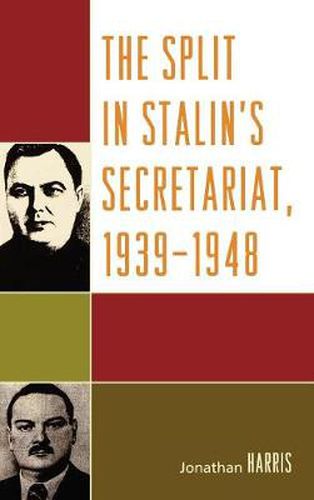Readings Newsletter
Become a Readings Member to make your shopping experience even easier.
Sign in or sign up for free!
You’re not far away from qualifying for FREE standard shipping within Australia
You’ve qualified for FREE standard shipping within Australia
The cart is loading…






Jonathan Harris demonstrates that the leaders of Stalin’s Secretariat clashed sharply over the nature of the Communist party’s leadership of the Soviet state in the period between 1939 and 1948. The term party leadership is generally misunderstood; it does not refer to the activities of the party as a whole, but to the efforts of its full time officials (the inner party ) to direct the activities of the members of the party who manned the Soviet state (the outer party ). This study argues that A. Zhdanov and G. Malenkov, the two junior Secretaries of the CC/VKP(B) who directed the two major bureaucratic divisions of the Secretariat for most of the period under review, supported diametrically opposed conceptions of the leadership to be provided by the party’s officials. A. Zhdanov argued that they should give priority to the ideological education of all members of the party and should allow the Communists who manned the state considerable autonomy in their administration of the five-year plans. In direct contrast, G. Malenkov, who directed the cadres directorate for most of the period under review, had little sympathy for ideological education and urged party officials to engage in close and detailed direction of the Communists who directly administered the five-year plans.
This study contends that it is possible to illustrate this never-ending conflict by a careful examination of the public discussion of this issue in the various publications controlled by the major divisions of the Secretariat. When examined in conjunction with recently published archival materials, it is possible to pinpoint the linkages between the leadership conflict within the Secretariat, the shifts in the ongoing public discussion, and Stalin’s role as the final arbiter in the dispute.
$9.00 standard shipping within Australia
FREE standard shipping within Australia for orders over $100.00
Express & International shipping calculated at checkout
Jonathan Harris demonstrates that the leaders of Stalin’s Secretariat clashed sharply over the nature of the Communist party’s leadership of the Soviet state in the period between 1939 and 1948. The term party leadership is generally misunderstood; it does not refer to the activities of the party as a whole, but to the efforts of its full time officials (the inner party ) to direct the activities of the members of the party who manned the Soviet state (the outer party ). This study argues that A. Zhdanov and G. Malenkov, the two junior Secretaries of the CC/VKP(B) who directed the two major bureaucratic divisions of the Secretariat for most of the period under review, supported diametrically opposed conceptions of the leadership to be provided by the party’s officials. A. Zhdanov argued that they should give priority to the ideological education of all members of the party and should allow the Communists who manned the state considerable autonomy in their administration of the five-year plans. In direct contrast, G. Malenkov, who directed the cadres directorate for most of the period under review, had little sympathy for ideological education and urged party officials to engage in close and detailed direction of the Communists who directly administered the five-year plans.
This study contends that it is possible to illustrate this never-ending conflict by a careful examination of the public discussion of this issue in the various publications controlled by the major divisions of the Secretariat. When examined in conjunction with recently published archival materials, it is possible to pinpoint the linkages between the leadership conflict within the Secretariat, the shifts in the ongoing public discussion, and Stalin’s role as the final arbiter in the dispute.